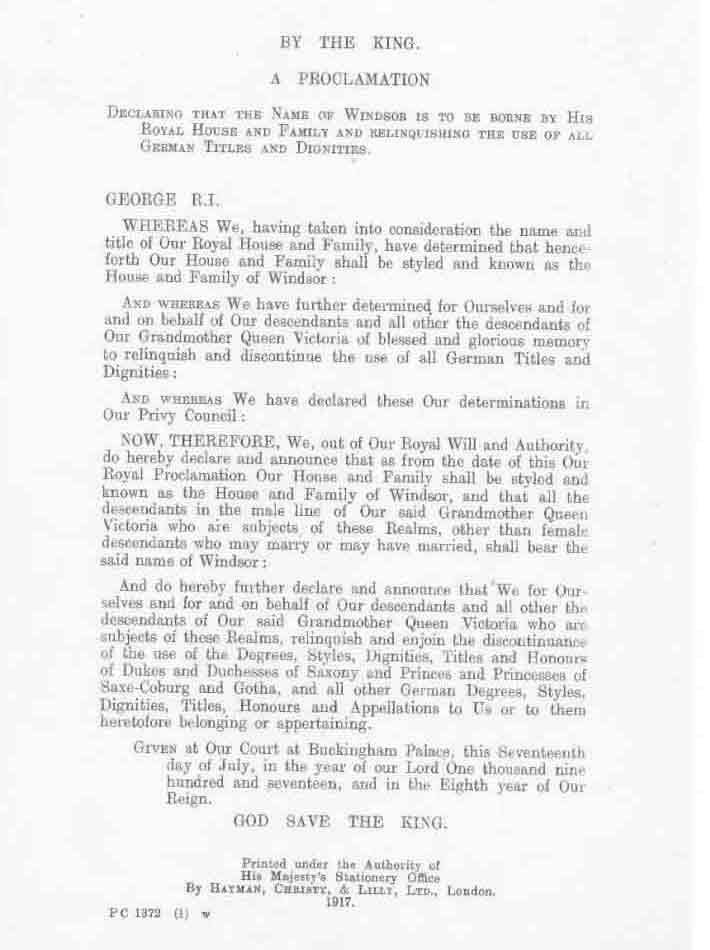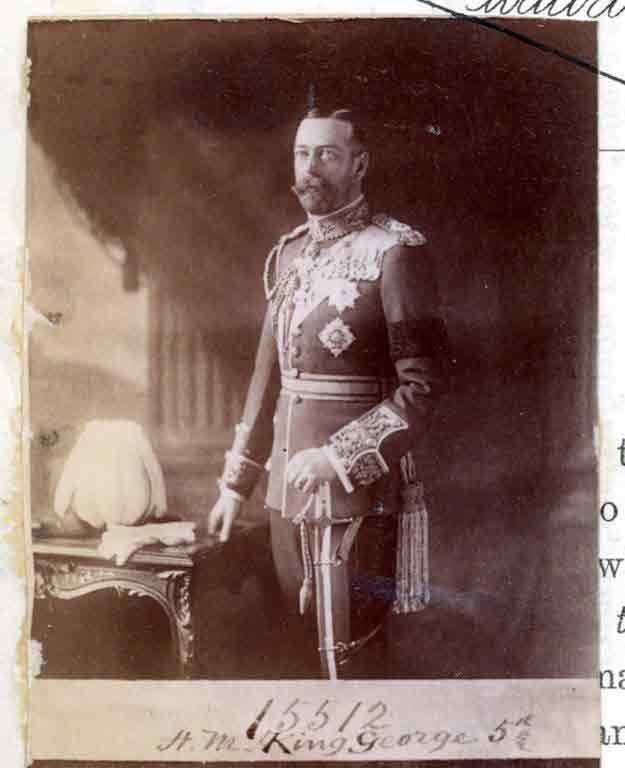
Royal proclamation of 17 July 1917 (catalogue reference: HO 45/13695)
In July 1917 King George V issued a proclamation renouncing all German titles and dignities for himself and his descendants, and changed the name of the royal house and family to the house and family of Windsor.
All descendants in the male line of Queen Victoria, except daughters who had married, or were to marry, were also to have the new name of Windsor. The proclamation was issued from Buckingham Palace on 17 July 1917.
There had been some dispute and confusion over what the name of the royal house actually was, since it had never been used publically, either officially or unofficially. Was it Wipper or Wettin, Welf or Guelph? (Wettin was the name of the Saxon royal house and Welf or Guelph was the name of the Hanoverian royal house.) If it were to be changed to remove any German associations what should the new name be?
Ties to Germany
Commonly called the house of Saxe-Coburg-Gotha the actual name of the family was Wettin. Prince Albert of Saxe Coburg Gotha was a duke of Saxony and a prince of Saxe-Coburg-Gotha when he married Queen Victoria on 10 February 1840. His father Ernest was the reigning Duke of Saxe-Coburg-Gotha until his death in 1844, when he was succeeded by his eldest son Ernest II (Prince Albert’s elder brother).
The personal union of Hanover and Great Britain ended in 1837: Salic law barred women inheriting the throne of Hanover. Queen Victoria was the last monarch of the house of Hanover on the British throne. Her son King Edward VII was the first British monarch of the house of Saxe-Coburg-Gotha, through his father being a duke of Saxony and prince of Saxe-Coburg-Gotha.
As Ernest II had no children, Victoria and Albert’s eldest son (the future Edward VII) was the heir to the duchy. Rather than have a personal union, as there had been between Hanover and Great Britain, he renounced his rights to Saxe-Coburg-Gotha in favour of his brother; Prince Alfred, Duke of Edinburgh, became the reigning duke in 1894. Alfred’s only son predeceased him in 1899, and the next male heirs in line, Prince Arthur, Duke of Connaught and his son Prince Arthur of Connaught, both renounced their rights to the duchy.
The next heir was the son of Prince Leopold, Duke of Albany. Prince Charles Edward, 2nd Duke of Albany became the reigning duke of Saxe-Coburg-Gotha on his Uncle Alfred’s death in 1900.
Choosing a new name

King George V in 1910, photo: A J H Downey (catalogue reference: COPY 1/548/322)
With the war, and understandable anti-German feeling in the UK, it was felt necessary for the royal family to renounce all German titles. A number of suggestions were made, usually recalling earlier royal houses. One such suggestion from the Duke of Connaught was Tudor-Stewart, but former Prime Ministers Lord Rosebery and Mr Asquith both felt this had ‘inauspicious associations’. Other names considered but swiftly rejected were ‘Plantagenet’, ‘York’, and ‘Lancaster’. ‘D’Este’ and ‘Fitzroy’ were also considered; even ‘England’ was suggested.
It was the King’s private secretary Lord Stamfordham who came up with the name ‘Windsor’, which had never been used before, and which was approved by the King. The proclamation was sent out from the Privy Council Office to other government departments and overseas to the dominions and colonies and was published in the press on the following day.
A change of name changes nothing materially but I have read the reason the name was changed was because of a bombing in the UK by a Gotha airplane, otherwise why wait almost three years to change the name?.
Indeed, there were a number of factors during the war which made a change of name desirable. The German Gotha G series of aircraft were some of the first effective bombers used for strategic bombing raids on England from early 1917 onwards.
There were also waves of anti-German sentiment throughout the war and criticism of any perceived German influence in high places. There were press and newspaper articles and H G Wells notably referred to “an alien and uninspiring court” to which the King is said to have responded “I may be uninspiring but I’ll be damned if I’m alien”.
The most important consideration, however, was the Russian revolution in March 1917, the forced abdication of the Tsar, and the anti-German feeling which had been directed at the “German” Tsarina.
Thank you very will written and informative articular. rr
What is the further update, on the surname/s of the present Royal Family?
[…] Giorgio V proclamò il cambio del cognome il 17 giugno 1917, rinunciando a tutti i titoli tedeschi e ai rispettivi diritti. Una scelta importante che […]
Up until 1963 the royal family had no surname. The article above specifically refers to ‘House of Windsor’ which replaced the ‘House of Saxe-Coburg Gotha’.
But in 1963, the Queen, the fount of all honour, gave the royal family the surname of ‘Mountbatten-Windsor’, while still remaining The House of Windsor. We’ve seen this being used several times on wedding certificates and the like, but as the law of surnames is much older than statute law (Acts of Parliament) it is covered by Canon Law and the only one who can change a surname (purely technically) is the monarch. Of course, people change their name by Deed Poll all the time, but technically….
Does any one know the reasoning behind the name D’Est
Este was the parent House of the common branch of Welf/Guelph.
The House Hanover was a cadet branch of the House of Guelph which was a cadet branch of the House of Este
So the suggestion of “D’Este” was a backtrace from Saxe-Coburg-Gotha to Hanover to Guelph to Este.